Everything you need to know about trellises
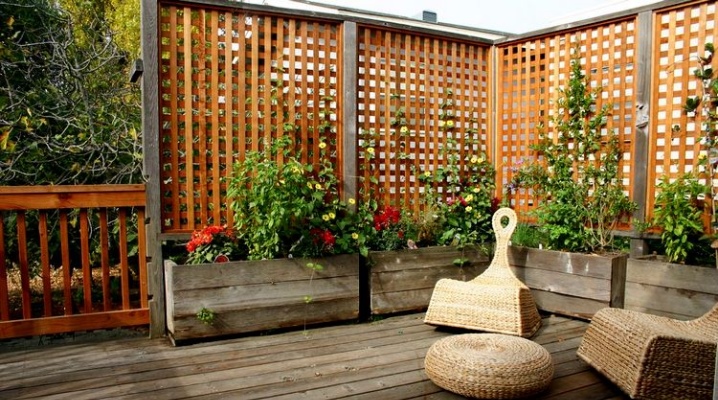
Every gardener or owner of a country house seeks to ennoble his site. To improve the aesthetic appeal of the territory, as well as to increase its functionality, a lot of methods have been developed, which include the installation of garden paths, gazebos, pools, flower beds, fountains, as well as planting original species of trees and shrubs. Trellis are considered one of the useful and therefore very popular options, with their help the growth and development of climbing vegetation is improved.
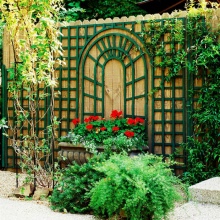
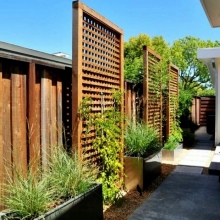
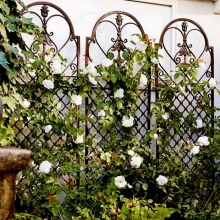
What it is?
A trellis is a special type of garden structure that looks like a trellis and serves as a support for horticultural crops. This device is characterized by beauty and functionality, therefore it is almost indispensable for the arrangement and improvement of the site. The original decorative lattice helps to maintain the branches of plants, in addition to everything else, it ensures the uniformity of penetration of sunlight relative to the entire length of the shoot. Thus, representatives of the flora are saved from decay, actively grow and bear fruit. The fruit that has grown in this way has the best quality and taste characteristics.
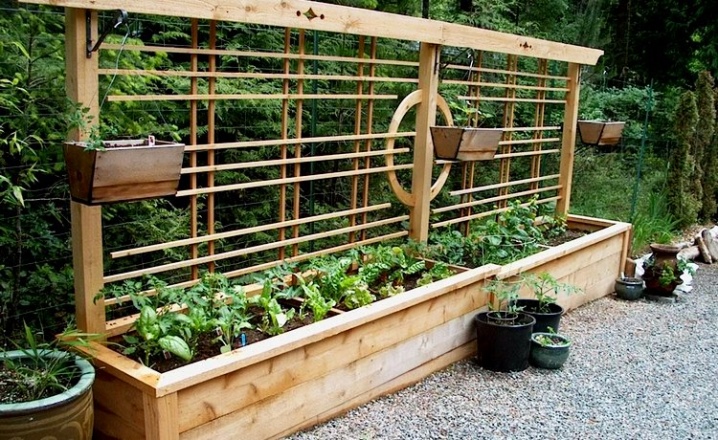
Thanks to the trellises, the ventilation of the crops is activated, and accordingly, they are a little ill and are not often attacked by pathogenic microorganisms. Insects have unhindered access to the flowers of such representatives of the flora, which stimulates good pollination. Also, decorative lattices contribute to the simple maintenance of garden vegetation, namely, its pruning and crown formation. Thus, the master has the opportunity to change the direction of growth of branches every year and thereby increase the yield of the crop.
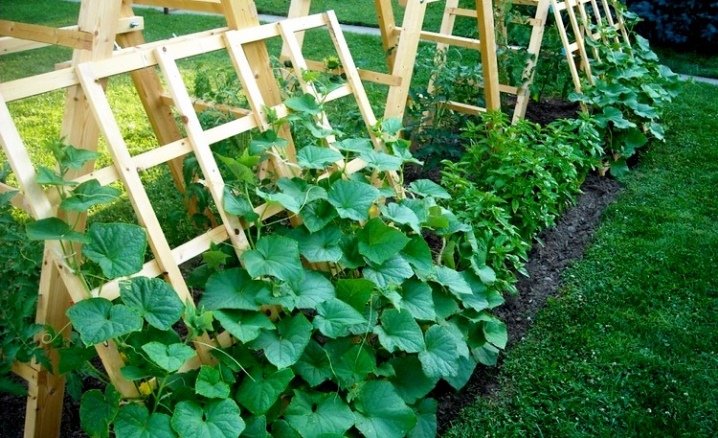
Tapestries are a variant of the original and elegant garden decoration. They are often used for climbing roses, ornamental honeysuckle, bindweed, grapes, raspberries, clematis, cucumbers, tomatoes and all kinds of climbing flowers and shrubs.
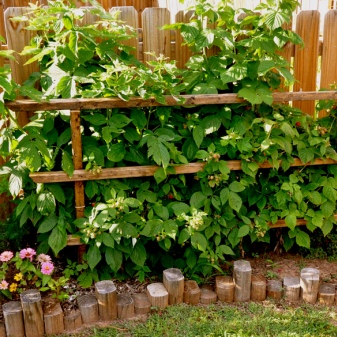
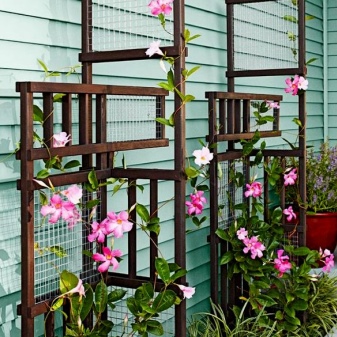
Species overview
Tapestries have found their application in the country, in the garden, greenhouse, they can even be placed on the wall of the house. They are also used to grow hops, gooseberries, peas and other varieties of loaches. This design looks different, the dimensions may also differ from each other.
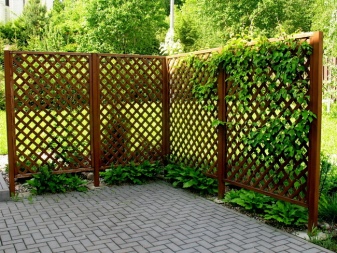
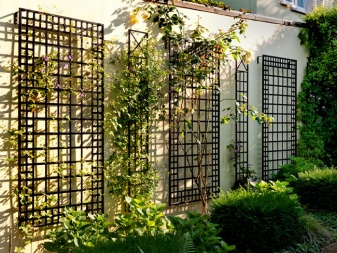
Trellis for climbing vegetation are of the following types:
- vertical single-plane;
- V - shaped;
- horizontal;
- vertical with a visor.
For ornamental and fruit crops, trellis-sail, trellis-fan are often used. In addition, home gardeners often install sliding, fan and Tulip designs.
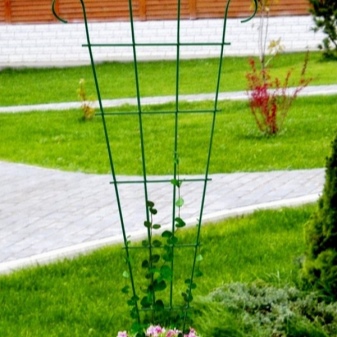
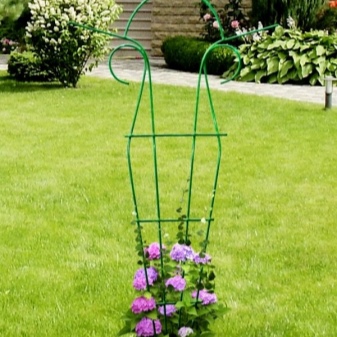
One-plane
Single-plane trellis are categorically not suitable for powerful vegetation with several arms, since their processes are not fixed after planting. This option is suitable as a trellis for curly flowers. In this case, the shoots and the vine are located on the same plane. Thanks to this design, the maximum illumination of each leaf of the culture occurs.
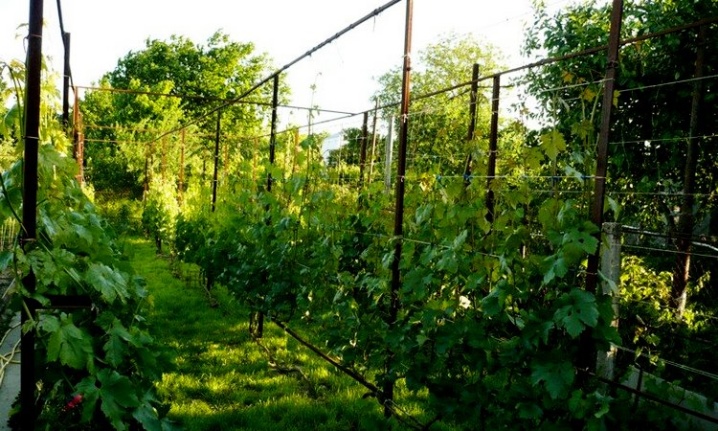
This type of trellis is suitable for growing a small number of crops. It is relevant for those representatives of the flora who need constant pruning. Such designs are able to save space. It doesn't take a lot of material to build them. Single-plane trellis are characterized by ease of manufacture.
Two-plane
Two-plane trellis are characterized by the shape of an inverted trapezoid. The use of this design contributes to the intensive growth of fruit crops. Their design can be very different, so it can be used both in greenhouses and on the balcony. The two-plane fixture is considered ideal for plants that do not need shelter for the winter.
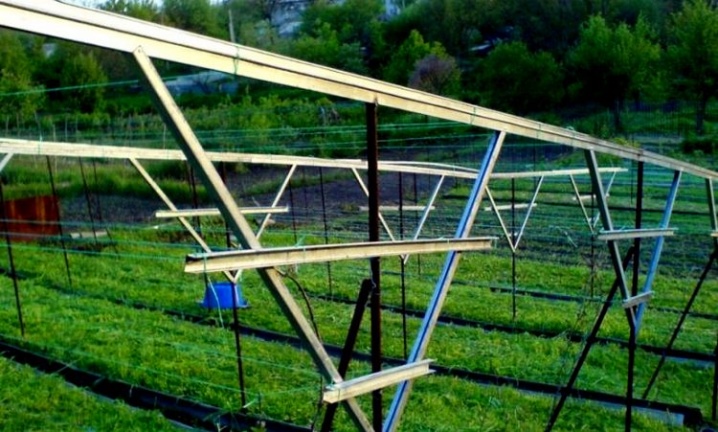
This design has found its application when growing fast-growing flora in a large area. These adaptations are able to make optimal use of space, which entails the growth and development of beautiful and healthy vegetation.
Two-plane trellis are divided into the following types:
- Straight lines are composed of a pair of parallel planes that are mounted with a distance of 0.6-1.2 meters from each other.
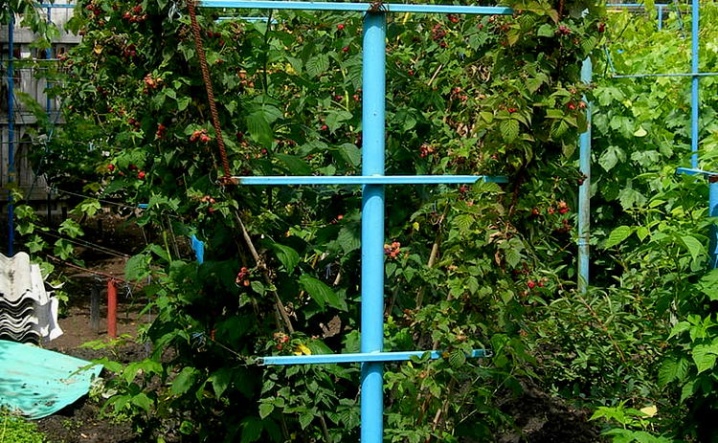
- V-shaped. These devices are made of two planes that are angled relative to each other.
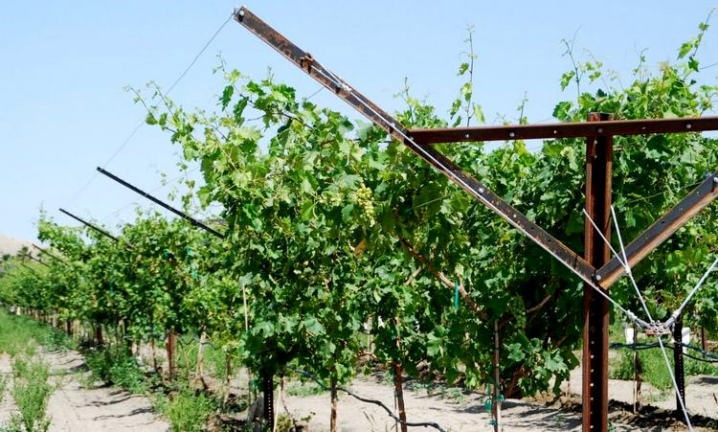
- Y-shaped trellis look like a plane, which is divided in half at the top. In this case, each of the planes is fixed at an angle of 45-60 degrees relative to the second.
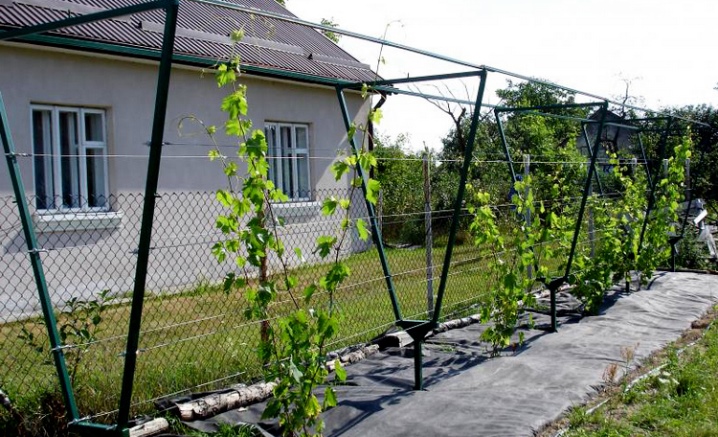
Materials (edit)
When choosing a material for the independent production of trellises, the master should take into account not only the features of the landscape design of the territory, but also the indicator of the strength, reliability, and resistance of the material to negative environmental factors.
Metallic
Forged metal trellises not only look attractive, but also have high performance. Forging elements give such products presentability and originality. The only drawback of such structures is their high cost.
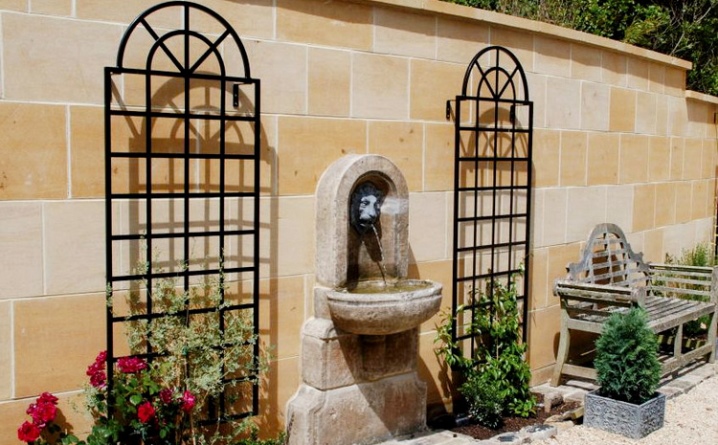
Plastic
PVC bindweed supports are considered an easy budget option. The main advantage of such structures is considered to be their low cost, but at the same time their stability is low. Many gardeners use trellises made from plastic pipes on their sites, since they can be given any curved configuration.
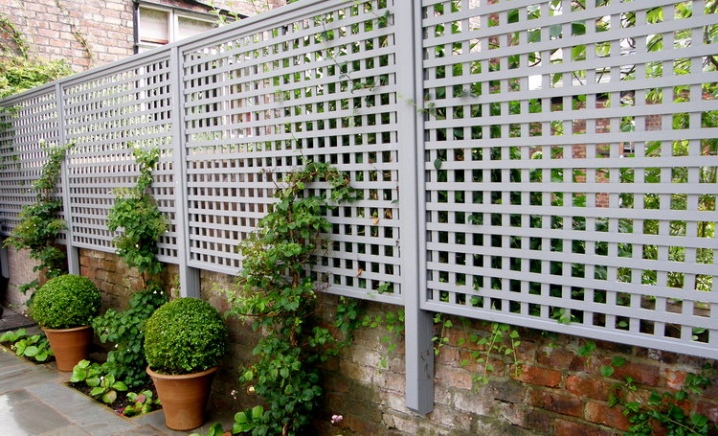
Other
In addition to the above options, on sale you can find tapestries made of WPC, fiberglass reinforcement, bamboo. Among the most demanded are wood products. Such structures have a long service life, subject to surface treatment with special protective equipment. Durable wooden products are able to fit into any landscape design of the territory.
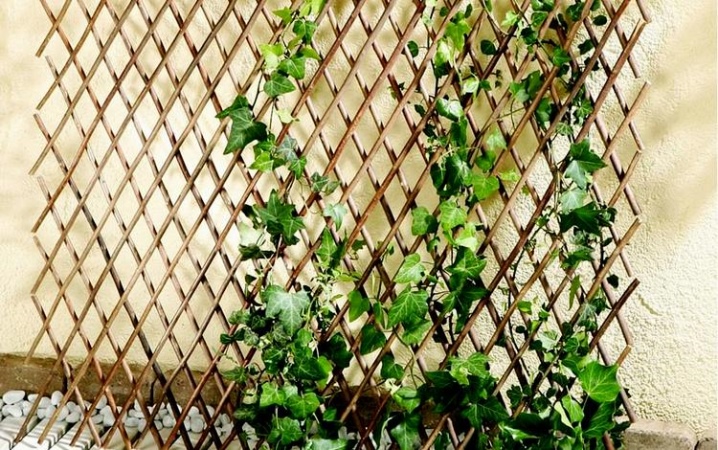
Often slats are used to make wooden trellises. For special originality, use material with carvings or paint structures. A worthy option for supports can be called devices from a profile pipe. They are characterized by resistance and therefore are used for tall crops.
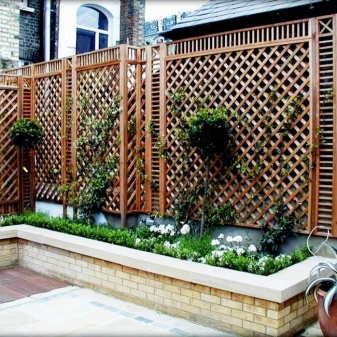
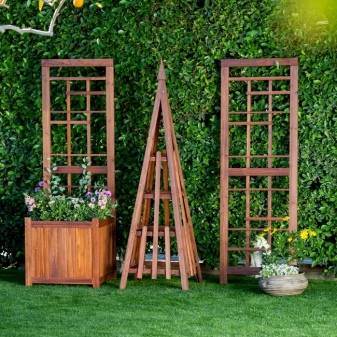
Wire trellises are considered the best option for low vegetation, they are often weaved at home.
Forms
Trellises for climbing vegetation can also have different shapes.
- Columnar. This design is simple, since it consists of a pair of posts, between which a wire or metal cable is stretched horizontally. Columnar trellis can be one- and two-bladed.
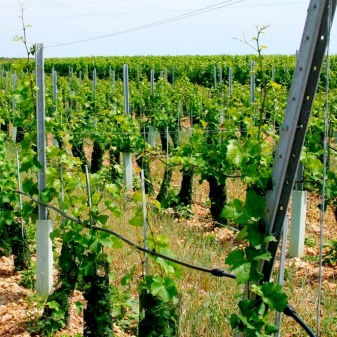
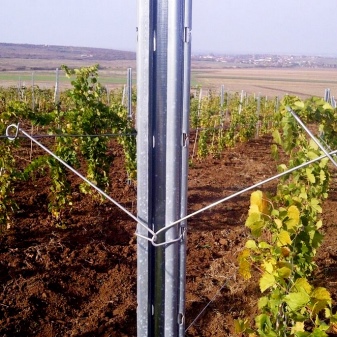
- Semi-arched. This type of support has an arc that is bent upward. Outwardly, it is quite similar to a canopy. A shadow is created under such a structure. This attachment is ideal for small planting areas. In this case, crops should be planted in one row. Planting in groups is recommended under conditions of different ripening periods.
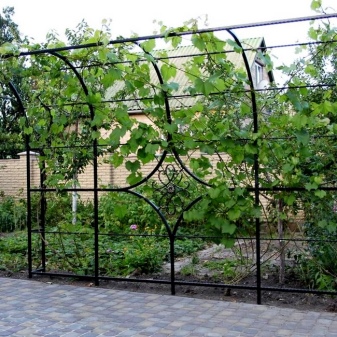
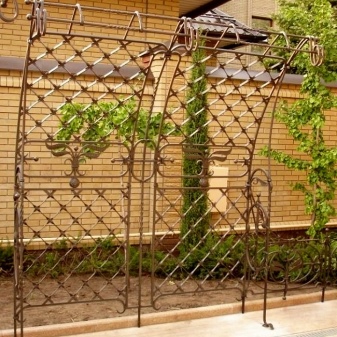
- Arched support is quite common in gardeners' plots. One of the advantages of this device is the creation of a large shaded area under which you can install garden furniture. The arched structure has an attractive appearance, however, if you want to make it yourself, slight difficulties may arise.Also, experts note some difficulties in the process of trimming vegetation.
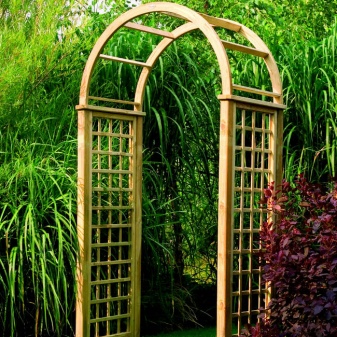
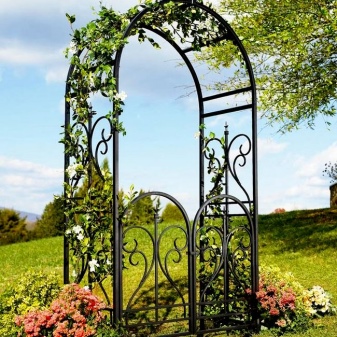
- Pergola is a type of arched trellis. It is considered the best support option for vigorous hybrids that do not have enough space on a one- or two-plane trellis. If such a device is installed, the gardener can count on a good photosynthesis process in plants, a minimal risk of infection with fungal infections, and ease of processing shrubs.
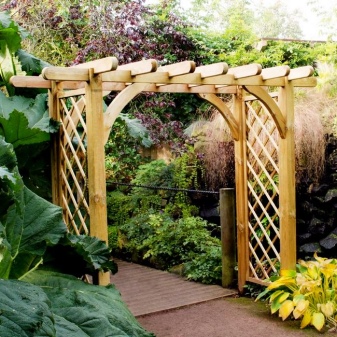
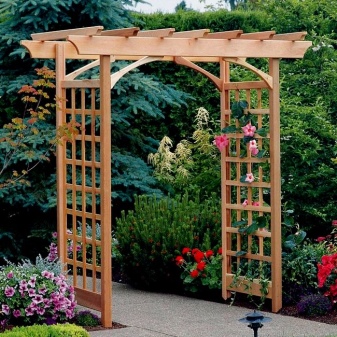
How to do it yourself?
You can make a one-plane trellis at home. However, it is advisable to have an assistant in this matter, since it will be rather difficult to carry out all the work on your own. To make a high-quality single-plane support, you will need to bury a pillar into the soil to a depth of 0.5 meters. In this case, it is worth observing a distance between the posts of 50 cm, as well as picking up pillars with a diameter of 7 to 10 cm. According to the recommendations of experts, the supports along the edges should be more massive than the others.
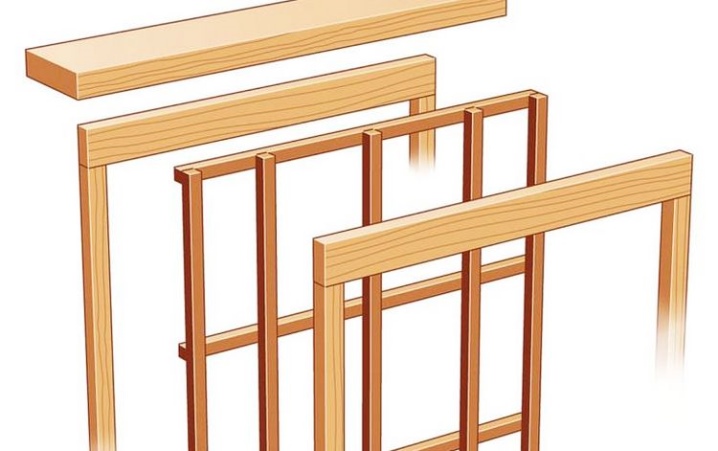
When using pillars made of wood, their lower half must be kept in a solution of copper sulfate in advance for several days. Such an event will be able to prevent rotting of the product. When using metal, it is advisable to cover the surface with a bituminous substance that will prevent corrosion.
For the construction of trellises, it is worth taking steel wire with a diameter of 3 to 5 mm. It will need to be pulled onto the fixed supports. If the wire is in several rows, then the distance between them should be from 35 to 40 cm.According to gardeners' reviews, trellis with wire in 4-5 rows are most effective. Fastening is carried out using nails, metal staples or other hardware.
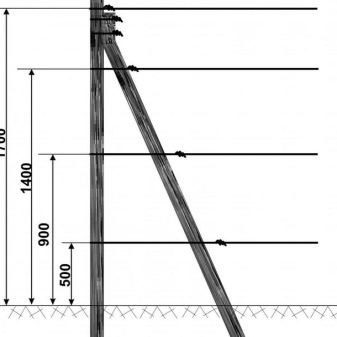
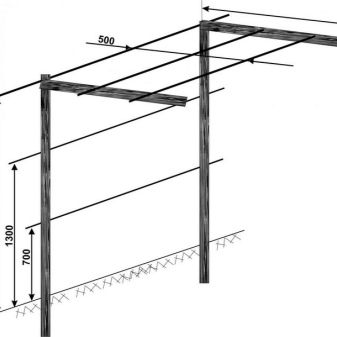
The production of two-plane trellises for climbing vegetation does not differ from the construction of one-plane ones. But instead of one design, several are made.
Stages of manufacturing a V-shaped support:
- digging two holes 0.6 meters deep;
- fixing pipes in them with a lower part treated with bitumen in advance;
- observance of a distance between pipes of 0.8 meters;
- breeding the upper boundaries of the pillars by 1.2 meters;
- fixing the position with crushed stone and carrying out concrete pouring;
- pulling the wire.
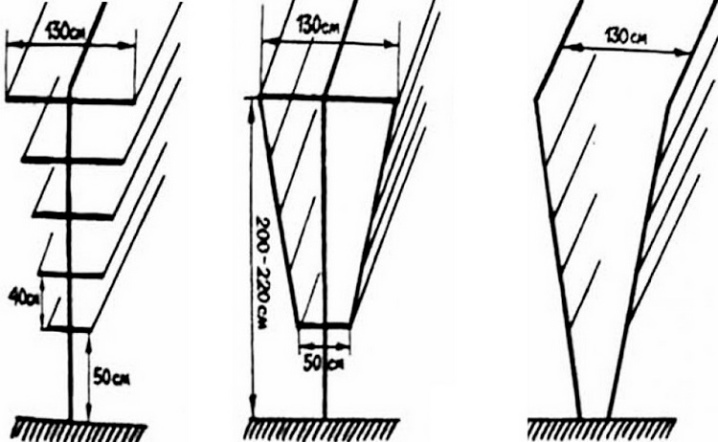
Beautiful examples in landscape design
Tapestries have a sophisticated look and can be a worthy decoration for a garden or a personal plot.
This structure looks great as a free-standing element or a structure attached to the wall. Forged arched structures themselves look pretty beautiful, but if they are skillfully positioned, then the territory will look even better. For example, installation at the entrance is a rather good option for the location of such a device. Thus, the site will delight guests from the very first minutes of being on it (example photo 1).
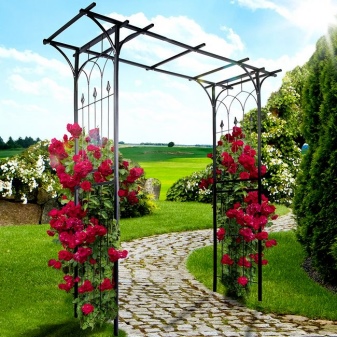
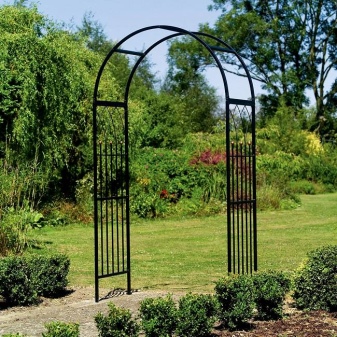
You can use a wooden trellis with a box for flowers to decorate a country courtyard or decorate a summer cafe in an unusual and neat way (example photo 2). In such a basket, pots with plants are installed - loaches, which, growing, will braid the trellis. Such a design with fresh flowers will not leave indifferent any visitor.
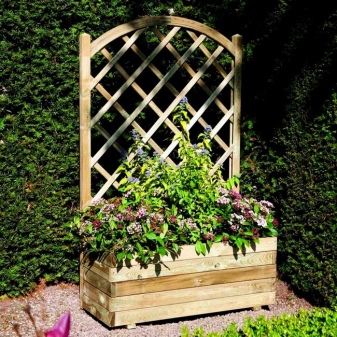
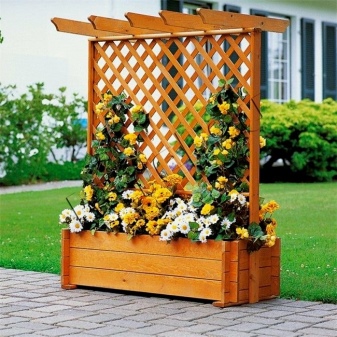
A wood trellis is a great way to divide an area into zones. The installation of such a product, braided with delicate flowers, is able to successfully decorate a recreation area or separate an outdoor dining room (example photo 3).
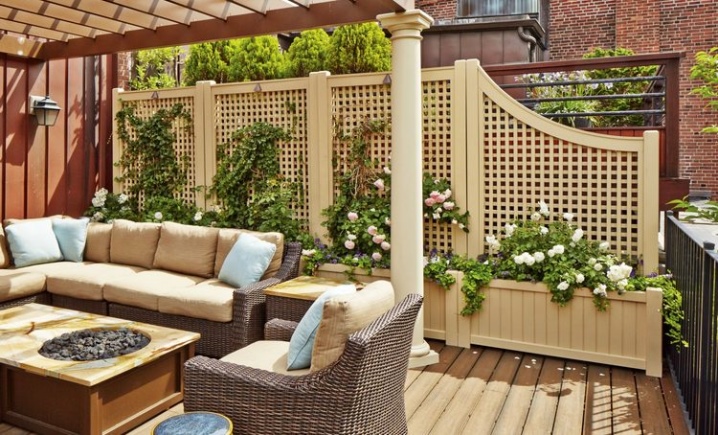
For more information on tapestries, see the video below.


































































The comment was sent successfully.